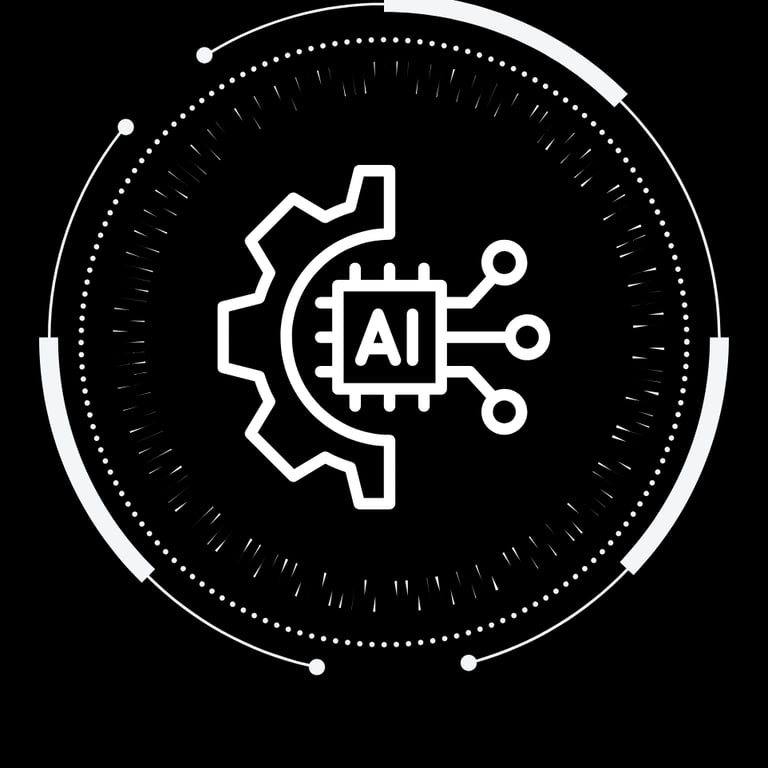Embracing the Future: Reasons to Implement Artificial Intelligence Technologies in Your Business
8/5/20255 min read


Understanding Artificial Intelligence and Its Benefits
Artificial Intelligence (AI) is a branch of computer science aimed at creating systems capable of performing tasks that typically require human intelligence. These tasks encompass a wide range of applications, including problem-solving, learning, reasoning, perception, and language understanding. In a business context, the integration of AI technologies presents numerous advantages that can lead to significant operational enhancements.
One of the primary benefits of AI is its ability to enhance efficiency across various business functions. Through automation, AI can streamline operations by taking over repetitive and mundane tasks, allowing human resources to focus on more strategic activities. For instance, AI systems can manage inventory, process transactions, and even handle customer inquiries through chatbots, significantly reducing the time required for these processes. This automation not only improves productivity but also helps to minimize errors that typically occur in manual tasks.
Moreover, businesses that leverage AI can harness data-driven insights to inform their decision-making processes. AI technologies can analyze vast amounts of data quickly and accurately, identifying patterns and trends that may not be immediately apparent to human analysts. This capability allows organizations to make informed decisions based on empirical evidence, leading to better outcomes and competitive advantages in their respective markets.
Additionally, AI is transforming the customer experience by personalizing interactions and offerings. Through advanced analytics, businesses can gain a deeper understanding of customer preferences and behaviors, enabling them to tailor their marketing strategies accordingly. This personalized approach not only enhances customer satisfaction but also fosters loyalty, driving long-term enterprise growth.
In summary, the implementation of AI technologies in business operations provides a multifaceted range of benefits. From enhancing efficiency and streamlining tasks to delivering valuable insights and improving customer experiences, AI has the potential to transform how businesses operate in today's fast-paced environment.
Competitive Advantages of AI Implementation
As businesses navigate an increasingly competitive landscape, the adoption of artificial intelligence (AI) technologies has emerged as a pivotal strategy for gaining a competitive edge. AI not only revolutionizes operational efficiencies but also enhances market differentiation, fosters innovation, and elevates customer engagement through personalized experiences tailored to individual preferences.
One of the significant competitive advantages offered by AI is its ability to differentiate brands in a crowded marketplace. By leveraging AI-powered analytics, companies can gain deep insights into consumer behavior and trends, allowing for the development of unique product offerings and marketing strategies. For instance, Netflix employs AI algorithms to analyze viewer preferences, suggesting personalized content that keeps users engaged and encourages subscription retention. This level of customization creates a strong competitive positioning against traditional media platforms, where such tailored experiences are harder to deliver.
Innovation is another critical benefit of AI implementation. Businesses that embrace AI technologies can streamline their processes and drive new initiatives that may not have been feasible otherwise. For example, Tesla has integrated AI into its autonomous driving capabilities, which not only enhances vehicle safety but also revolutionizes the way consumers perceive transportation. This constant push for innovation places companies at the forefront of their industries, compelling competitors to adapt or risk obsolescence.
Furthermore, AI enhances customer engagement by facilitating personalized interactions across various touchpoints. Brands leveraging AI chatbots provide timely and relevant assistance, improving customer satisfaction and loyalty. Sephora, for instance, utilizes AI-driven beauty advisors on its website to offer personalized recommendations based on users' skin tones and preferences, significantly boosting conversion rates.
In conclusion, the implementation of AI technologies presents numerous competitive advantages for businesses. From market differentiation and fostering innovation to enhancing customer engagement, companies that invest in AI not only bolster operational effectiveness but also secure their foothold in an ever-evolving landscape. The case studies of enterprises like Netflix, Tesla, and Sephora serve to illustrate the profound impact AI can have on driving business success.
Cost Efficiency and ROI from AI Technologies
Implementing Artificial Intelligence (AI) technologies in business operations can lead to significant cost efficiency and improved return on investment (ROI). The adoption of AI-driven systems enables companies to automate repetitive tasks, streamline processes, and enhance decision-making capabilities. These advancements often result in reduced operational expenses, which can drastically lower overall costs.
One of the primary ways AI contributes to cost efficiency is through the minimization of human error. Traditional processes often rely on manual labor, which is inherently prone to mistakes, potentially leading to costly rework and impacting productivity. By automating these functions with AI technologies, businesses can ensure higher accuracy and consistency, which directly translates to cost savings over time. Moreover, AI can analyze vast amounts of data quickly, allowing for more informed and timely decisions that can mitigate financial loss.
In terms of financial implications, the initial investment in AI technologies may appear substantial; however, the long-term savings and profitability make a compelling case for budget allocation towards AI initiatives. For instance, companies that have integrated AI solutions in customer service have reported decreased response times and better customer satisfaction. This not only leads to direct operational cost reductions but also fosters customer loyalty, resulting in increased revenue streams.
Additionally, AI can be applied in predictive maintenance, especially in manufacturing sectors. By analyzing data from machinery, AI systems can predict failures before they happen, allowing for timely maintenance and avoiding expensive downtimes. The return on investment from reduced maintenance costs and increased operational capacity demonstrates the financial viability of AI implementations.
Ultimately, while the transition to AI-driven technologies requires careful consideration of upfront costs, the eventual benefits in cost efficiency and ROI underscore the strategic value of embracing AI in business operations.
Challenges and Considerations for AI Integration
The integration of artificial intelligence (AI) technologies within businesses presents unique challenges that require careful consideration. One primary concern is the necessity for employee training. As organizations adopt AI systems, the existing workforce may need upskilling to adapt to new tools and frameworks. This transition can provoke anxiety and uncertainty among employees, prompting resistance to change. To alleviate these concerns, companies should prioritize ongoing education and offer robust support programs that encourage staff engagement and confidence in utilizing AI technologies effectively.
Another significant consideration involves the ethical implications associated with AI. Companies must navigate complex questions surrounding data usage, algorithm biases, and the potential for decision-making without human oversight. Establishing clear ethical guidelines and ensuring transparency in AI processes can help build trust among stakeholders. Organizations should actively involve teams in ethical discussions and develop policies that uphold fairness and accountability, addressing any biases that may arise during the AI implementation process.
Data privacy concerns are equally critical. As more businesses collect and analyze vast amounts of data through AI technologies, the need for stringent data protection measures becomes paramount. Companies must comply with regulations such as the General Data Protection Regulation (GDPR) and other local laws governing data privacy. Implementing robust security protocols and utilizing anonymization techniques can safeguard sensitive information while maximizing the benefits of AI analytics.
To effectively navigate these challenges, businesses should develop a strategic approach that incorporates stakeholder engagement, continuous training initiatives, ethical considerations, and stringent data protection measures. By addressing these factors proactively, organizations can foster a smoother transition into an AI-driven landscape, enhancing operational efficiency while ensuring the integrity of their practices and the welfare of their employees.
Ascentia AI Solutions
AI-powered solutions for the modern business.
Support
Services
+1-437-255-2041
© 2025 Ascentia AI Solutions. All rights reserved.
Company
Legal


